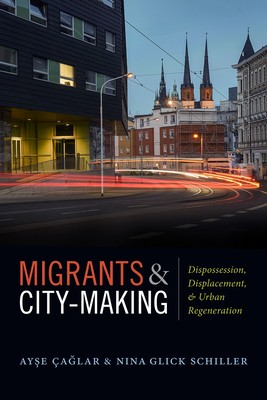
- We will send in 10–14 business days.
- Author: Ayse Ãaglar
- Publisher: Duke University Press
- ISBN-10: 0822370565
- ISBN-13: 9780822370567
- Format: 15.2 x 22.9 x 1.8 cm, softcover
- Language: English
- SAVE -10% with code: EXTRA
Reviews
Description
In Migrants and City-Making Ayşe Ãağlar and Nina Glick Schiller trace the participation of migrants in the unequal networks of power that connect their lives to regional, national, and global institutions. Grounding their work in comparative ethnographies of three cities struggling to regain their former standing--Mardin, Turkey; Manchester, New Hampshire; and Halle/Saale, Germany--Ãağlar and Glick Schiller challenge common assumptions that migrants exist on society's periphery, threaten social cohesion, and require integration. Instead Ãağlar and Glick Schiller explore their multifaceted role as city-makers, including their relationships to municipal officials, urban developers, political leaders, business owners, community organizers, and social justice movements. In each city Ãağlar and Glick Schiller met with migrants from around the world; attended cultural events, meetings, and religious services; and patronized migrant-owned businesses, allowing them to gain insights into the ways in which migrants build social relationships with non-migrants and participate in urban restoration and development. In exploring the changing historical contingencies within which migrants live and work, Ãağlar and Glick Schiller highlight how city-making invariably involves engaging with the far-reaching forces that dispossess people of their land, jobs, resources, neighborhoods, and hope.
EXTRA 10 % discount with code: EXTRA
The promotion ends in 6d.08:39:45
The discount code is valid when purchasing from 10 €. Discounts do not stack.
- Author: Ayse Ãaglar
- Publisher: Duke University Press
- ISBN-10: 0822370565
- ISBN-13: 9780822370567
- Format: 15.2 x 22.9 x 1.8 cm, softcover
- Language: English English
In Migrants and City-Making Ayşe Ãağlar and Nina Glick Schiller trace the participation of migrants in the unequal networks of power that connect their lives to regional, national, and global institutions. Grounding their work in comparative ethnographies of three cities struggling to regain their former standing--Mardin, Turkey; Manchester, New Hampshire; and Halle/Saale, Germany--Ãağlar and Glick Schiller challenge common assumptions that migrants exist on society's periphery, threaten social cohesion, and require integration. Instead Ãağlar and Glick Schiller explore their multifaceted role as city-makers, including their relationships to municipal officials, urban developers, political leaders, business owners, community organizers, and social justice movements. In each city Ãağlar and Glick Schiller met with migrants from around the world; attended cultural events, meetings, and religious services; and patronized migrant-owned businesses, allowing them to gain insights into the ways in which migrants build social relationships with non-migrants and participate in urban restoration and development. In exploring the changing historical contingencies within which migrants live and work, Ãağlar and Glick Schiller highlight how city-making invariably involves engaging with the far-reaching forces that dispossess people of their land, jobs, resources, neighborhoods, and hope.


Reviews